

3 Linguistics Podcasts Every Language Lover Should Listen To. Podcasts offer people the opportunity to learn, be entertained, or catch up on news while plodding through everyday tasks.
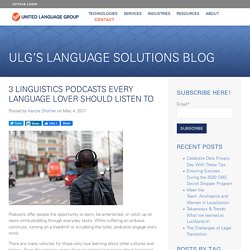
While suffering an arduous commute, running on a treadmill or scrubbing the toilet, podcasts engage one’s mind. There are many vehicles for those who love learning about other cultures and history. From this passion, many form an interest in learning about languages. The world of linguistics podcasts is vast and varied and there are a plethora of podcasts for language lovers. Here are three great linguistics podcasts for the language lovers of the world. The History of English Podcast The straightforward title of the History of English can be misleading. Stroud spends every episode focused on the source of words related to specific subjects like law, property, marriage, farming, business, etc. Stroud not only discusses etymology of English words, he also explains historical events and their influence on English today. Episode recommendation: Norse Words and New English. Hablemos de gramática en serio. La interpretación de los mensajes que nos llegan se basa en un complejo mecanismo en el que se tienen que poner en marcha muchas operaciones cognitivas.
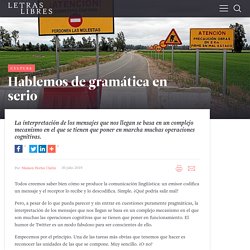
Todos creemos saber bien cómo se produce la comunicación lingüística: un emisor codifica un mensaje y el receptor lo recibe y lo descodifica. Simple. ¿Qué podría salir mal? Pero, a pesar de lo que pueda parecer y sin entrar en cuestiones puramente pragmáticas, la interpretación de los mensajes que nos llegan se basa en un complejo mecanismo en el que son muchas las operaciones cognitivas que se tienen que poner en funcionamiento. El humor de Twitter es un modo fabuloso para ser conscientes de ello. Empecemos por el principio. Otra sería asignarle una categoría a cada unidad. Y una tercera: asignar la denotación o referencia a los sintagmas. Uno de los que más juego da es el complemento predicativo, ese adjetivo que modifica al verbo y a un participante del evento al mismo tiempo. 1. 2. 3. 4. 5.
Linguistic Landscape and Language Learning - Malinowski - - Major Reference Works. Together with its contributions in fields such as sociolinguistics, language policy, and social semiotics, linguistic landscape has become a compelling arena of interest for language learning as well.
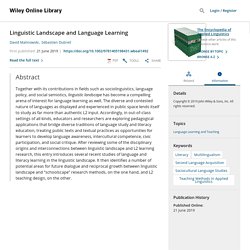
The diverse and contested nature of languages as displayed and experienced in public space lends itself to study as far more than authentic L2 input. Accordingly, in out‐of‐class settings of all kinds, educators and researchers are exploring pedagogical applications that bridge diverse traditions of language study and literacy education, treating public texts and textual practices as opportunities for learners to develop language awareness, intercultural competence, civic participation, and social critique.
After reviewing some of the disciplinary origins and interconnections between linguistic landscape and L2 learning research, this entry introduces several recent studies of language and literacy learning in the linguistic landscape.
Cómo leemos en la sociedad digital. Hoy justo hace un mes que se presentaba el libro “¿Cómo leemos en la sociedad digital?
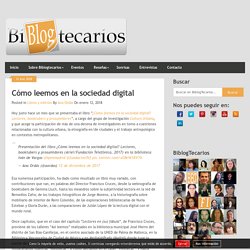
Lectores, booktubers y prosumidores“, a cargo del grupo de investigación Cultura Urbana, y que acoge la participación de más de una decena de investigadores en torno a cuestiones relacionadas con la cultura urbana, la etnografía en/de ciudades y el trabajo antropológico en contextos metropolitanos. Presentación del libro ¿Cómo leemos en la sociedad digital? Lectores, booktubers y prosumidores (Ariel/Fundación Telefónica, 2017) en la biblioteca Iván de Vargas @bpmmadrid @fundacionTef pic.twitter.com/xOBrW1KVYh— Ana Ordás (@aordas) 12 de diciembre de 2017 No importa cuanto leemos sino cuanto contribuye lo que leemos a la vida de las personas #lectura pic.twitter.com/y8jiR0qkEG— Ana Ordás (@aordas) 12 de diciembre de 2017. Compositionality and Concepts in Linguistics and Psychology.
By highlighting relations between experimental and theoretical work, this volume explores new ways of addressing one of the central challenges in the study of language and cognition.
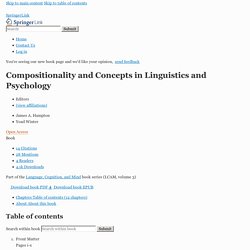
The articles bring together work by leading scholars and younger researchers in psychology, linguistics and philosophy. An introductory chapter lays out the background on concept composition, a problem that is stimulating much new research in cognitive science. Researchers in this interdisciplinary domain aim to explain how meanings of complex expressions are derived from simple lexical concepts and to show how these meanings connect to concept representations.
Traditionally, much of the work on concept composition has been carried out within separate disciplines, where cognitive psychologists have concentrated on concept representations, and linguists and philosophers have focused on the meaning and use of logical operators. Congreso, coloquio o simposio. Título: IV Jornadas ELE Complutense: tendiendo nuevos puentes entre lenguas y culturas Entidad organizadora: Facultad de Filología, Universidad Complutense de Madrid Lugar de celebración: Madrid, España.
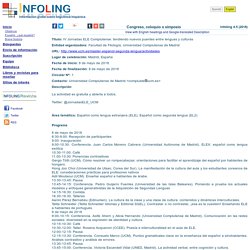
Vista de La importancia del lenguaje y la redacción en el trabajo académico - científico.